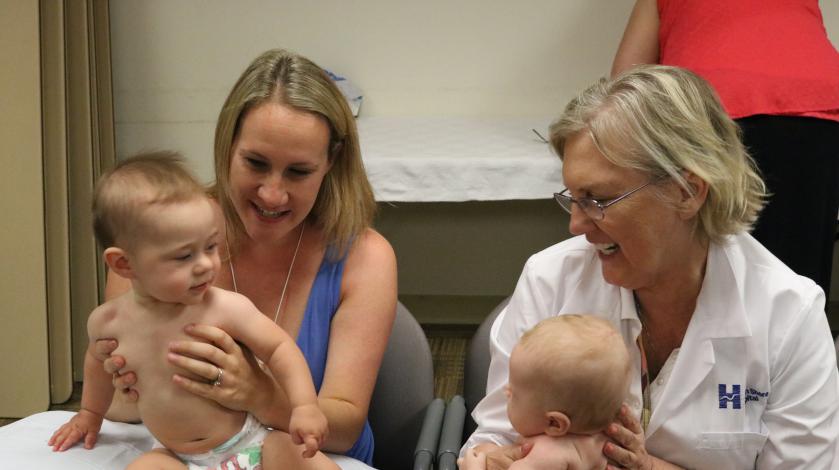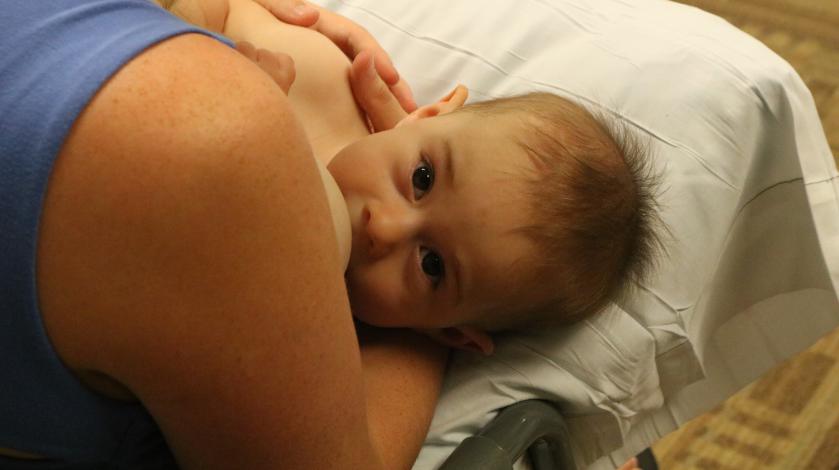Breastfeeding Support
Call Our Lactation "Warm Line"
781-624-8602

South Shore Health offers lactation & breastfeeding support. Our goal is to help you understand your feeding options and meet your feeding goals. Our facility is staffed with IBCLCs, CLCs and RNs that are here to support you with latching, positioning, hand-expressing, and pumping throughout your postpartum stay. Should you require additional support, our lactation consultants are available to provide assistance to you even after you are discharged.
Nursing FAQs
The “Right Way” to feed your baby is the way YOU choose to feed your baby and we will support you every step of the way. Our goal is to help you meet YOUR feeding goals.
At South Shore Health we pride ourselves in supporting and encouraging you to breastfeed your baby. However, should your baby require supplementation in addition to your breastmilk, we offer pasteurized human donor milk as well as formula. The American Academy of Pediatrics (AAP) emphasizes that breastfeeding and human milk are the best options for infant feeding and nutrition. Should your baby require additional nutrition after breastfeeding for medical reasons, the AAP suggests the following order for supplementation:
Expressed Mother’s Milk - Mothers can hand express and pump to provide additional milk that has special properties, including antimicrobial and anti-inflammatory elements, which help develop the baby’s gut microbiome and immune system.
Pasteurized Donor Human Milk (when available) - PDHM is available to babies at South Shore Health. PDHM supports the baby’s gut microbiome. A healthy microbiome is important for building a strong immune system.
Formula – Formula may also be used. Formula is a non-human milk feeding alternative.
Pasteurized Donor Human Milk is breastmilk that has been donated by a medically screened and approved milk donor. The milk is pasteurized and tested before being distributed. The Mother’s Milk Bank Northeast is accredited by the Banking Association of North America (HMBANA) and regulated by the Food and Drug Administration (FDA) as well as local and state authorities. Donor milk can provide a short-term “bridge” to breastfeeding, often improving long-term breastfeeding outcomes which have significant maternal and infant health benefits.
*Please ask RN or LC for more information about PDHM
Donor Breast Milk • Mothers' Milk Bank Northeast (milkbankne.org)
Day 1
24 hours
During the 1st 1-2H after birth babies have periods of awake and alertness followed by many hours of sleepiness. This is an opportunity to follow your infant’s feeding cues. Striving for 8 feeding attempts during this period. Use this opportunity for supervised skin-to-skin.
Goal: at least 1 wet & 1 dirty diaper
Day 2
24-48 hours
On day 2 babies become more wakeful and begin to increase the desire to nurse. This is completely normal. Keep your baby close and allow your baby to nurse as desired. Your baby should be offered to breastfeed at least every 3 hours.
Goal: at least 2 wet & 2 dirty diapers
Day 3
48-72 hours
“Cluster” feeding begins. Increase feeding frequency following your infant’s cues. Your baby may want to feed 10-12 times this day.
Goal: at least 3 wet & 3 dirty diapers
Day 4
72 -120 hours
Your milk supply will begin to increase and you should notice an increase in audible swallows. Your baby should be eating 8-12 times per 24 hours.
Goal: At least 4-5 wet & 4-5 dirty diapers
Early introduction to bottles and pacifier may hinder a plentiful milk supply.
Breastfeeding Tips (Newborn and Infant Breastfeeding)
- The Golden Hour - Breastfeed within the 1st hour after birth
- Practicing safe skin to skin. Placing your infant (wearing a diaper and hat) against your bare skin.
- Rooming in with your baby and learning your infant’s feeding cues
- Avoid early introduction to bottles and pacifiers. *Pacifier use has been associated with lower risk of SIDS. The American Academy of Pediatrics recommends pacifier use after breastfeeding has been well established.
At South Shore Health, we recommend the Golden Hour to all birthing parents and newborns who are medically stable.
Benefits of the Golden Hour
Birthing Parent
- Reduction in postpartum bleeding
- Increase both breastmilk supply and breastfeeding success rates
- Decrease the risk of postpartum depression, anxiety and mood disorders
- Higher oxygen levels
Newborn
- Improved weight gain
- More stable breathing & heart rate
- Better breastfeeding
- Long-Term development and attachment benefits
Golden Hour - Skin to Skin Understanding the Golden Hour: Background & Benefits | South Shore Health
You do not need to bring your own pump into the hospital. While inpatient the hospital has breast pumps available for use until discharge. Rest assured we can help you with the ordering process to obtain a personal pump for home use. Dartmouth Medical is our medical supply company. If your insurance is not covered by Dartmouth Medical we have other options available to you.
Pumped About Nursing | Order a Breast Pump | Dartmouth Medical Equipment (dmeinc.net)
- Persistent low production/supply
- Persistent breast nipple pain/damage
- Mastitis, Abscess, Galactoceles
- Prior breast/chest surgery
- Oversupply (painful or problematic)
- Medical co-morbidities
- Anticipated preterm delivery
- Anticipated infant complications
- Discharge from NICU
- Re-lactating and/or inducing lactation
- Previous difficulty breastfeeding
*Prenatal consults are available if a preterm delivery is anticipated
Lactation Education Resources (LER) Parent Handouts - Lactation Education Resources (lactationtraining.com)
SSH Lactation Support GroupEvents & Programs | South Shore Health
SSVNA – South Shore Health VNA | Visiting Nurses Association
Zipmilk.org local LC Resources. Neighborhood breastfeeding help is a click away | ZipMilk
Lactation Warm Line – 781-624-8602 The Warm line is a phone line dedicated to calls relevant to lactation and breastfeeding support. An International Board Certified Lactation Consultant (IBCLC) will return your call and offer you the support and guidance you need.
More Additional Resources
Lactation Education Resources (LER) Parent Handouts - Lactation Education Resources (lactationtraining.com)
American Academy of Breastfeeding Medicine Breastfeeding Practice Tools for Health Professionals (aap.org)
Breastfeeding Groups and New Parent Classes
- Breastfeeding Support Groups
- New Parent Classes
- All Classes
- Breastfeeding Support Group
- Breast Milk Depot
- Pasteurized Human Donor Milk

Our Breastfeeding Support Group at South Shore Hospital meets Mondays, Wednesdays, and Fridays, 12:30-1:30 p.m. Registration is required. Join our warm, supportive environment for breastfeeding advice.
You are also welcome to call the "Warm Line" at 781-624-8602 with breastfeeding questions.
Provide a Precious Resource

South Shore Hospital is proud to be a human milk depot, working in partnership with Mothers’ Milk Bank Northeast.
You can read more about our partnership here.
Visit the Mother’s Milk Bank Northeast website to learn more about donating breast milk at South Shore Hospital. You can also call a Donor Intake Coordinator for screening at 617-527-6263 extension 3, or email donate [at] milkbankne.org.
The Donor Intake Coordinator will provide further details on how to bring the milk to South Shore Hospital.
Pasteurized Human Donor Milk
South Shore Hospital offers pasteurized human donor milk (PHDM) to support newborn feeding needs.
Our PHDM is supplied by Mother’s Milk Bank Northeast, a non-profit, community-supported entity driven by the belief that every baby deserves the chance to thrive.
If you have questions about the use of PHDM after your baby is born, please speak to your care team.




